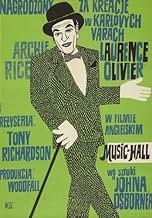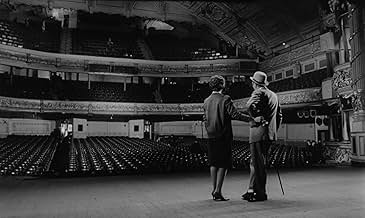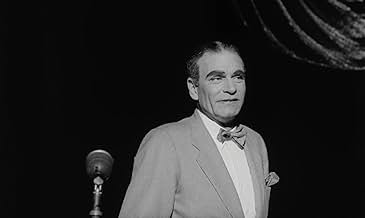AVALIAÇÃO DA IMDb
7,1/10
4 mil
SUA AVALIAÇÃO
Adicionar um enredo no seu idiomaArchie Rice, an old-time British music hall performer sinking into final defeat, schemes to stay in show business.Archie Rice, an old-time British music hall performer sinking into final defeat, schemes to stay in show business.Archie Rice, an old-time British music hall performer sinking into final defeat, schemes to stay in show business.
- Direção
- Roteiristas
- Artistas
- Indicado a 1 Oscar
- 1 vitória e 5 indicações no total
Laurence Olivier
- Archie Rice
- (as Lawrence Olivier)
Brenda de Banzie
- Phoebe Rice
- (as Brenda De Banzie)
Shirley Anne Field
- Tina Lapford
- (as Shirley Ann Field)
MacDonald Hobley
- McDonald Hobley
- (as McDonald Hobley)
Avaliações em destaque
As someone who lives only a couple of miles away from where this film was set, it makes me practically WEEP to see how busy and vibrant Morecambe used to be in the 50s/60s. OK, so the film is about how it's passed its heyday, but compared to how it is now - seeing the same scenery (it's hardly changed) - the Midland Hotel, The Winter Gardens (now a nightclub), it's hard not to get painful pangs of nostalgia.
This is ultimately a depressing film - Archie is one of those people who deals with tragedy by "blanking" it out with bad jokes. In the film he seduces the winner (2nd place) of a beauty contest - a woman old enough to be his daughter. Shortly after the film, Laurence Oliver married Joan Plowright who actually PLAYED his daughter in this film. Anyone for irony?
There are some wonderfully subtle takes on British "class" - I love Thora Hird (a long way from Praise Be and Stannah Stairlifts here) as the grasping mum of the Beauty-contest winner, while Brenda de Banzie is great as neurotic, looked-over, teary, nervy Phoebe - "I've got a new job in Woolworths, on the electrical counter. It's OK, but the girls are a bit common." Well Phoebe, you'll be pleased to know that the branch of Woolworths is still there...
This is ultimately a depressing film - Archie is one of those people who deals with tragedy by "blanking" it out with bad jokes. In the film he seduces the winner (2nd place) of a beauty contest - a woman old enough to be his daughter. Shortly after the film, Laurence Oliver married Joan Plowright who actually PLAYED his daughter in this film. Anyone for irony?
There are some wonderfully subtle takes on British "class" - I love Thora Hird (a long way from Praise Be and Stannah Stairlifts here) as the grasping mum of the Beauty-contest winner, while Brenda de Banzie is great as neurotic, looked-over, teary, nervy Phoebe - "I've got a new job in Woolworths, on the electrical counter. It's OK, but the girls are a bit common." Well Phoebe, you'll be pleased to know that the branch of Woolworths is still there...
10lora64
I've seen this movie many times on tv and still feel irresistibly drawn into the realistic setting of people's humdrum lives at a British seaside resort. Some films can be viewed once and that's enough, but not this one.
All the cast members are remarkable in projecting the ordinary bleakness of the story's circumstances -- the people, time and place, their foibles, tragedies, and often futile efforts as they struggle with events. Believe it or not, I even got to like Olivier's singing of "Why Should I Care"!
A memorable, thoughtful film well worth experiencing.
All the cast members are remarkable in projecting the ordinary bleakness of the story's circumstances -- the people, time and place, their foibles, tragedies, and often futile efforts as they struggle with events. Believe it or not, I even got to like Olivier's singing of "Why Should I Care"!
A memorable, thoughtful film well worth experiencing.
That little song that Laurence Olivier sings through out The Entertainer as part of his musical hall act really does sum up his philosophy of life.
Outside of the classics this is Olivier's greatest role and some would not even put that qualifier on his performance. Olivier retained great affection for his role as Archie Rice. He said it contained more of the real him than any other role.
That's hard to believe because what Archie Rice is is a third rate song and dance man. His father played by Roger Livesey was a great performer back in the day. But Archie never has and never will make it to the top. Think Frank Sinatra and Frank Sinatra, Jr. and you get some idea.
He's more like Willy Loman in that he's facing his midlife crisis, knowing full well he's not really accomplished all that much. Still he plods on. Unlike Willy the luckless middle-aged salesman, Archie's full of tricks. His credit is all gone, and he's planning to woo and win a young beauty who's an airhead like her mom with the object of getting their backing for a new show. He's ready to throw over wife Brenda DaBanzie without a by your leave.
The only one who Olivier has any kind of human feelings for is his daughter played by Joan Plowright. It was in the original cast of The Entertainer that Olivier first met the woman who became the third and last Mrs. Olivier. When he was made a peer in fact Joan became Lady Olivier.
In fact from the Broadway production, Olivier, Plowright and DaBanzie were the only ones from that cast who were in the film. But some rising young talent like Alan Bates, Albert Finney, and Daniel Massey all got some good first notice in The Entertainer playing Olivier's two sons and Plowright's fiancé.
The Entertainer is a downer of a film. There ain't a middle aged man who doesn't know what Archie is going through. But our sympathies are never with him. Usually that would mean one big box office flop if the audience can't sympathize or empathize. But it's Olivier's skill as a player that makes us want to see what does become of Archie.
It's an ending, but in a very minor key. Well deserved I thought.
Outside of the classics this is Olivier's greatest role and some would not even put that qualifier on his performance. Olivier retained great affection for his role as Archie Rice. He said it contained more of the real him than any other role.
That's hard to believe because what Archie Rice is is a third rate song and dance man. His father played by Roger Livesey was a great performer back in the day. But Archie never has and never will make it to the top. Think Frank Sinatra and Frank Sinatra, Jr. and you get some idea.
He's more like Willy Loman in that he's facing his midlife crisis, knowing full well he's not really accomplished all that much. Still he plods on. Unlike Willy the luckless middle-aged salesman, Archie's full of tricks. His credit is all gone, and he's planning to woo and win a young beauty who's an airhead like her mom with the object of getting their backing for a new show. He's ready to throw over wife Brenda DaBanzie without a by your leave.
The only one who Olivier has any kind of human feelings for is his daughter played by Joan Plowright. It was in the original cast of The Entertainer that Olivier first met the woman who became the third and last Mrs. Olivier. When he was made a peer in fact Joan became Lady Olivier.
In fact from the Broadway production, Olivier, Plowright and DaBanzie were the only ones from that cast who were in the film. But some rising young talent like Alan Bates, Albert Finney, and Daniel Massey all got some good first notice in The Entertainer playing Olivier's two sons and Plowright's fiancé.
The Entertainer is a downer of a film. There ain't a middle aged man who doesn't know what Archie is going through. But our sympathies are never with him. Usually that would mean one big box office flop if the audience can't sympathize or empathize. But it's Olivier's skill as a player that makes us want to see what does become of Archie.
It's an ending, but in a very minor key. Well deserved I thought.
One of the best British films of the sixties, The Entertainer was written as an allegory of Britain's fall from grace by the leading fist-shaker of England's band of Angry Young Men who stormed the London stage with revolutionary new ideas and content, John Osborne. While Look Back In Anger is a more decorated play, this film adaption by Osborne and Nigel Kneale carried the flag of teeth-crunching kicks that the gang of young playwrights hoped to startle the daylights out of England with. Reading the other viewer comments, it is obvious most folks were looking for a Disney story with a Shakespearean performance by Lawrence Olivier. A happier ending? Great Britain forgot to supply one, Andy up there in the mountains somewhere, and the seedy digs were meant to be depressingly seedy, as was the dwindling talent of the family, and its reliance in the end on the grand old name and the grand old accomplishments of the past, as Archie Rice gave his best in replacing his revered father, Billy. Note his offkey performance in singing early on and then the eloquent on key final rendition of "Why Should I Care" as the final performance ends not with a curtain call, but with the hook, as the theater management (those other nations running the world today) angrily demand that Archie get off the stage because he is through, finished, washed up, fired, kaputsky, so long and goodbye. From the direction of Tony Richardson to the selection of grand old places along the sea that Britain once ruled with absolute certainty, everything and every moment of this film are topnotch. The aforementioned slandered scene with Roger Livesey as the Grandfather, Billy Rice, and Brenda de Banzie as Phoebe Rice, involving a misunderstanding over a piece of cake, is one of the most moving and depressingly realistic family arguments ever written. It may not be Olivier's greatest performance ever, but for certain it is the best one ever filmed. It also features the film debut of two actors who would establish themselves among the very best performers Great Britain has offered us, Alan Bates and Albert Finney, along with the introduction of Joan Plowright. As for the unkind comment about Olivier marrying Joan Plowright and this somehow having an ironic similarity to the theme of Archie and his young women; they married in 1961 and REMAINED together until Olivier's death in 1989, which is completely the opposite of the point made in the story. Well anyone is allowed to be in error, but this great film has to rank with our own country's Night of the Hunter as one of the most misunderstood films of all time. Don't miss it,ever, and MGM Vintage Classics has issued an excellent DVD edition.
As an American, getting a peek at post-War Britain in decline, a look at Olivier as a most interesting character in the person of never-was vaudevillian Archie Rice, and a look at several British players (Joan Plowright, Anthony Bates, and Albert Finney) very early in their careers is priceless.
Archie Rice is a despicable character, and the drama centers on his problems of having all of his financial issues - including some long overdue tax debt - come to a head just as he can finally get no more work as a vaudevillian even in the bad music halls. He has a way out - one of his relatives will pay off his debts if he'll accept his drunken wife's nephew's offer to run a motel in Canada. But like any Briton who can remember England's finer days he's just not about to cut and run, and even though I can despise the lying, the cheating on his used up wife, his odd ideas about parenting, and his willingness to use his own father, I can't help but admire his "pioneer spirit" to use an American term. He'd rather fail on his own terms than succeed on someone else's.
Joan Plowright is the other lead, and she plays Archie's daughter, Jean. She shows some pioneer spirit herself. She shares some characteristics with dad - she's a painter who can't paint, Archie's a vaudevillian who can't entertain. Unlike dad, she owns up to her shortcomings and wants to make a contribution anyways by teaching art to poor slum kids. She has a way out of Britain just like dad does. Her fiancé has been offered a job opportunity in Africa, and he encourages her to leave her dead country behind, but she just isn't ready to give up on England or her family just yet. The two have a falling out and Jean goes to visit her dysfunctional family, in which she finds comfort.
I just don't get people who say that they don't like this one because it's boring, depressing, ugly. Every minute of this film held my interest and stayed with me long after I'd watched it. I think you need to have lived awhile, to have had disappointments, and to have dealt with those disappointments in ways you may not be proud of to really appreciate this film.
Archie Rice is a despicable character, and the drama centers on his problems of having all of his financial issues - including some long overdue tax debt - come to a head just as he can finally get no more work as a vaudevillian even in the bad music halls. He has a way out - one of his relatives will pay off his debts if he'll accept his drunken wife's nephew's offer to run a motel in Canada. But like any Briton who can remember England's finer days he's just not about to cut and run, and even though I can despise the lying, the cheating on his used up wife, his odd ideas about parenting, and his willingness to use his own father, I can't help but admire his "pioneer spirit" to use an American term. He'd rather fail on his own terms than succeed on someone else's.
Joan Plowright is the other lead, and she plays Archie's daughter, Jean. She shows some pioneer spirit herself. She shares some characteristics with dad - she's a painter who can't paint, Archie's a vaudevillian who can't entertain. Unlike dad, she owns up to her shortcomings and wants to make a contribution anyways by teaching art to poor slum kids. She has a way out of Britain just like dad does. Her fiancé has been offered a job opportunity in Africa, and he encourages her to leave her dead country behind, but she just isn't ready to give up on England or her family just yet. The two have a falling out and Jean goes to visit her dysfunctional family, in which she finds comfort.
I just don't get people who say that they don't like this one because it's boring, depressing, ugly. Every minute of this film held my interest and stayed with me long after I'd watched it. I think you need to have lived awhile, to have had disappointments, and to have dealt with those disappointments in ways you may not be proud of to really appreciate this film.
Você sabia?
- CuriosidadesAccording to the April 21, 1958, edition of Time Magazine, as an addendum to its cover story on Sir Alec Guinness, in 1957, Sir Laurence Olivier turned down a Hollywood offer of two hundred fifty thousand dollars for one movie. Instead of making the movie and pocketing the cash, Olivier preferred to take on the role of Archie Rice in this movie (a role written specifically for him) at the Princely sum of forty-five pounds sterling per week.
- Erros de gravaçãoWhen Jean is with her grandfather on the promenade; some of the background people in the crowd are either looking at the camera or reacting out of character to the film shooting of the principal actors.
- Citações
Billy Rice: You were a pretty little thing. Not that looks are important - not even for a woman. You don't look at the mantelpiece when you poke the fire.
- ConexõesFeatured in V.I.P.-Schaukel: Episode #7.1 (1977)
- Trilhas sonorasWhy Should I Care?
(uncredited)
Music by John Addison
Lyrics by John Osborne
Performed by Laurence Olivier
Played occasionally in the score
Principais escolhas
Faça login para avaliar e ver a lista de recomendações personalizadas
- How long is The Entertainer?Fornecido pela Alexa
Detalhes
Bilheteria
- Orçamento
- £ 247.716 (estimativa)
- Tempo de duração
- 1 h 36 min(96 min)
- Cor
- Proporção
- 1.66 : 1
Contribua para esta página
Sugerir uma alteração ou adicionar conteúdo ausente
































